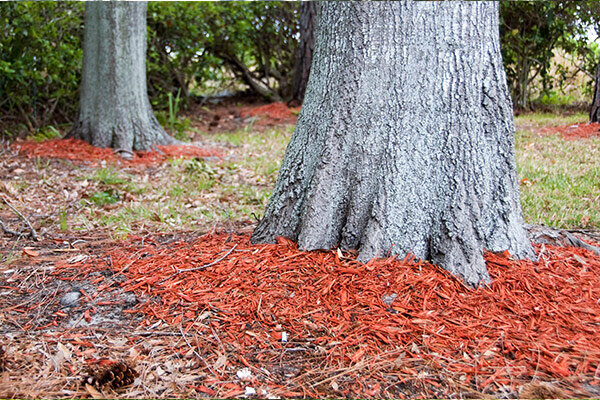Pros and Cons of Using Mulch Around Your Trees
Mulching around your trees is a bit of a controversial topic – while some folks love to mulch, others are more wary. We’d like to point out that there are pros and cons. Mulch has its place and, as with all gardening and landscaping, careful tending and keeping an eye on things is always necessary. Everyone’s experience is different.
If you want to mulch around your tree – for health, for appearances, for curb appeal, or anything else – there are some things you should take into consideration beforehand. Be sure to think about your own yard as you read through this list:
Pro: Lowers Damage Risk To Lower Parts Of The Tree
- Great if your tree isn’t part of a larger garden
- Be careful not to cover roots that stick out of the ground
- Don’t use more than necessary
The first reason to consider mulch is that it does a great job of protecting the base of the tree, which is vulnerable in many yards. This is a great option for those who have children or those who do a lot of their own yard work.
Now, the University of Illinois reminds us that trees actually have all that they need to protect themselves in nature. The bark is a natural layer of protection from animals, infestations, and natural occurrences. Your riding tractor isn’t a natural occurrence and neither is a kid on a scooter. By putting mulch down, you can avoid many problems that plague residential trees, including damage from basic yard work that can actually lead to infestations, diseases, and total tree death.
Of course, if the main goal is to protect the bottom of the tree, you don’t actually need to go that far away from the tree. If you go more than a foot or two, you aren’t doing anything beneficial for the tree (but you also aren’t doing anything bad for it).
Con: Unhealthy Secondary Root Systems May Emerge
- Secondary roots can make your garden difficult to work in
- They also take up much more room and can cause damage
- Happens more often in transplanted trees
Secondary root systems aren’t always a problem, but they can be, especially if they start to develop later in a tree’s life. Eventually, they can start to squeeze nutrients from the tree and you may see a portion of the tree die or change colors. Fixing this problem requires time and skill.
Some secondary roots (also known as feeder roots) are good. They are small and can provide a majority of the nutrients. They are also known to go rogue. They need looser soil so that they can move and stay healthy. Mulch can help to keep that soil loose or it can lead to compacting. It is all in the application.
To avoid this, Taking Place in Trees suggests the following planting methods: “The addition of 2-4″ of mulch (kept away from the trunk) would help the soil retain moisture and an even temperature, add organics to it over time, and lessen the chance of soil compaction that inhibits soil/air gas exchange.”
Pro: Helps Conserve Soil Moisture
- Moist soil helps trees grow strong and healthy
- Helps to preserve rainwater so you have to water less
- Reduces monthly water bills
As a tree sits in the sun, the soil surface heats up and water starts to evaporate. This can lead to root death quite quickly. A layer of mulch reduces the exposure to the sun and therefore reduces moisture loss. It also insulates the soil so that wind won’t dry it out.
According to the Morton Arboretum, there is another reason why you may need mulch to help with moisture: “As mulch breaks down it adds humus to the soil, increasing organic matter in the surface of heavy clay soils and improves the water holding capacity of light, sandy soils, and slowly releasing nitrogen and phosphorous into the soil.”
Finally, mulch can help to eliminate runoff and erosion if you have a lot of sitting water on your property, your children play with sprinklers, or it is a particularly rainy season. You will need to think about your own yard and how your trees are positioned. No matter what, mulch can help here.
Con: Most People Have Trouble Picking The Right Mulch
- Too many people don’t know their soil composition
- The cheapest mulch often does more damage
- Good mulch can be hard to find
You cannot just go to a local store and buy mulch and think that it is going to help. More often than not, it will actually cause more issues than it helps. There are many, many types of mulch out there. In general, most people want to use organic mulches, but not all inorganic mulches are bad, according to The Old Famer’s Almanac.
The question isn’t really whether or not a mulch is good, but whether or not it is good for your property, your trees, your soil, and your environment. What works for you may not work for your neighbor – it is all a science. The best thing you can do is get your soil tested or work with a tree care professional to get the proper formulation that you need. Sometimes you will have to combine a few different mulches to get that perfect blend.
Need help with mulching? Want to find a source for your mulch? Have a tree care question? Need help with maintenance? If you believe that you have a problem with the trees or in your yard, give us a call today at (269) 216-6811. We’d love to chat about how we can help you. There is no job too big or too small – contact our professionals today!


